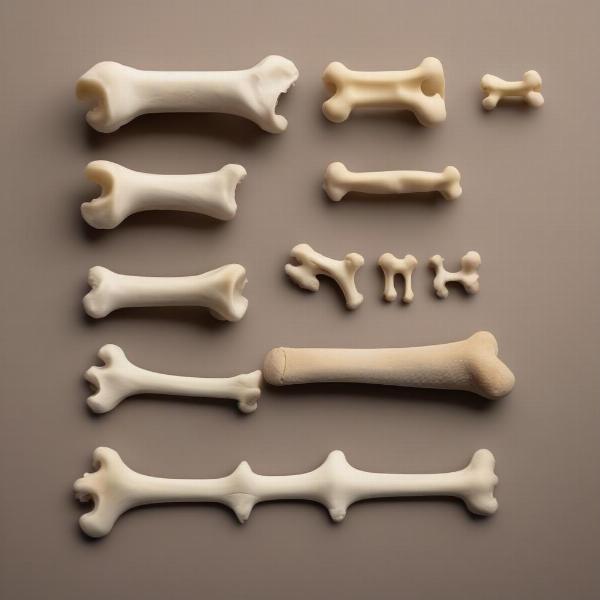Bulk dog bones offer a cost-effective and convenient way to provide your canine companion with long-lasting chews. However, navigating the world of bulk bones requires careful consideration of factors like size, material, and your dog’s individual needs. This guide will delve into the benefits and drawbacks of bulk dog bones, offering practical advice on choosing the right ones for your furry friend.
Types of Bulk Dog Bones and Their Benefits
When purchasing bulk dog bones, you’ll encounter a variety of options, each with its own pros and cons. Recreational bones, such as marrow bones, offer a flavorful and engaging chewing experience. Power chews, like bully sticks or rawhide, provide a long-lasting challenge for aggressive chewers. Dental chews are designed to promote oral hygiene by scraping away plaque and tartar. Understanding these differences is key to selecting the best type for your dog’s chewing style and health needs.
Choosing the Right Size and Material
 Comparing different sizes of dog bones to highlight the importance of choosing the correct size based on the dog's breed and chewing strength.
Comparing different sizes of dog bones to highlight the importance of choosing the correct size based on the dog's breed and chewing strength.
Selecting the correct size is crucial for preventing choking hazards. Always choose bones that are appropriately sized for your dog’s breed and chewing strength. A bone that is too small can be swallowed whole, while a bone that is too large can be difficult to manage and potentially lead to jaw injuries. Similarly, the material of the bone plays a significant role in its safety and durability. Avoid cooked bones, which can splinter and cause internal damage. Opt for raw, natural bones or durable synthetic alternatives.
Safe Chewing Practices with Bulk Dog Bones
While dog bones offer numerous benefits, including mental stimulation and dental health, supervision is always recommended. Never leave your dog unattended with a bone, especially a new one. Monitor them for signs of excessive wear or breakage and remove the bone if it becomes small enough to be swallowed. Regularly inspect your dog’s mouth for any signs of irritation or injury. Remember, a safe chewing experience is a happy chewing experience.
Are Bulk Dog Bones Economical?
Are bulk dog bones truly a cost-effective option? Generally, yes. Buying in bulk often translates to lower per-unit costs, making it a smart choice for dog owners on a budget. vitagen dog food specials However, consider the long-term value. A high-quality, durable bone might be more expensive upfront but could last longer than several cheaper alternatives. Ultimately, the most economical choice depends on your dog’s chewing habits and the specific type of bone you select.
Storing Bulk Dog Bones
Proper storage of bulk dog bones is essential to maintain their quality and prevent spoilage, especially for natural chews. Store bones in a cool, dry place, preferably in an airtight container to prevent moisture and pests. least expensive raw dog food For raw bones, freezing can help extend their shelf life. Always check for signs of mold or unusual odors before giving a bone to your dog.
Conclusion
Bulk dog bones offer a practical and economical solution for satisfying your dog’s natural chewing instincts. kelp benefits for dogs By understanding the different types of bones available, choosing the right size and material, and implementing safe chewing practices, you can ensure that your furry friend enjoys a safe and rewarding chewing experience.
FAQ
- What are the benefits of giving my dog bones? Chewing on bones provides mental stimulation, cleans teeth, and satisfies natural chewing instincts.
- What types of bones are safe for dogs? Raw, natural bones and durable synthetic chews are generally safe. Avoid cooked bones, which can splinter.
- How do I choose the right size bone for my dog? Select a size that is appropriate for your dog’s breed and chewing strength.
- How often should I give my dog a bone? This depends on your dog’s individual needs and chewing habits. Monitor them closely during chewing sessions.
- How should I store bulk dog bones? Store bones in a cool, dry place, preferably in an airtight container. Freezing can extend the shelf life of raw bones.
- Can I give my puppy bulk dog bones? Yes, but choose bones specifically designed for puppies and supervise them closely. dog splint leg
- What should I do if my dog breaks a bone into small pieces? Immediately remove any small pieces to prevent choking hazards.
ILM Dog is a leading international online resource dedicated to providing dog owners worldwide with reliable, practical information on all aspects of dog care and upbringing. [duvet cover dogs](https://ilmdog.com/duvet cover-dogs.html) From breed selection to health care, training, nutrition, and product recommendations, our expert content helps you make informed decisions for your furry companion. We cater to all experience levels, from novice to seasoned dog owners. Contact us at [email protected] or +44 20-3965-8624 for personalized advice. Visit ILM Dog today for more valuable insights and resources to enrich your dog’s life.